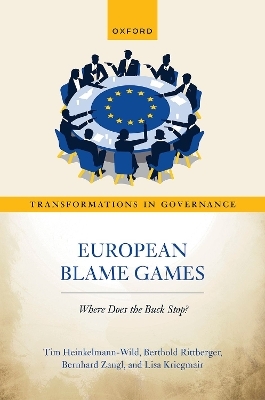
European Blame Games
Oxford University Press (Verlag)
978-0-19-287063-6 (ISBN)
European Blame Games challenges the conventional wisdom that the complexity of EU decision-making eschews clarity of responsibility, thereby rendering European blame games untargeted and diffuse. The book argues that the politicization of EU policies triggers a plausibility assessment of blame attributions in the public domain with the effect that European blame games gravitate towards true responsibilities, targeting those political actors involved in enacting a policy that is subsequently considered a policy failure.
It distinguishes three kinds of European blame games. In scapegoat games, supranational EU institutions are held responsible for a policy failure. Renegade games occur when individual member state governments are considered the culprits for a failed policy. When responsibility for a policy failure is shared between EU institutions and member states, diffusion games prevail. The book also explores three conditions to explain when each of the three European blame games prevails: the type of policy failure, the type of policy making, and the type of policy implementation. To empirically probe these conditions, European Blame Games studies the blame games in ten instances of EU policy failures, including EU foreign policy, environmental policy, fiscal stabilization, and migration policy.
Transformations in Governance is a major academic book series from Oxford University Press. It is designed to accommodate the impressive growth of research in comparative politics, international relations, public policy, federalism, and environmental and urban studies concerned with the dispersion of authority from central states to supranational institutions, subnational governments, and public-private networks. It brings together work that advances our understanding of the organization, causes, and consequences of multilevel and complex governance. The series is selective, containing annually a small number of books of exceptionally high quality by leading and emerging scholars.
The series is edited by Liesbet Hooghe and Gary Marks of the University of North Carolina, Chapel Hill, and Walter Mattli of the University of Oxford.
This is an open access title available under the terms of a [CC BY-NC-ND 4.0 International] licence. It is free to read at Oxford Scholarship Online and offered as a free PDF download from OUP and selected open access locations.
Tim Heinkelmann-Wild is a Research Fellow at the Chair of Global Governance and Public Policy and the Chair of International Relations at LMU Munich, Germany. He previously obtained a Bachelor in Political Science and History as well as a Master in Political Science at LMU Munich. He held visiting positions at Nuffield College as well as the Department of Politics and International Relations (DPIR) at the University of Oxford. He works on blame games and international organizations, such as the European Union or the International Monetary Fund, the contestation of international institutions by established powers, and indirect governance in warfare. Berthold Rittberger is Professor of Political Science and International Relations at LMU Munich, Germany. He previously held positions at the University of Mannheim and the Technical University of Kaiserslautern. He obtained his D.Phil. at the University of Oxford and was a Prize Research Fellow (PPRF) at Nuffield College, Oxford. He is co-editor in chief of the Journal of European Public Policy (together with Jeremy Richardson). Bernhard Zangl is Professor of Global Governance and Public Policy at LMU Munich, Germany. He holds an MA from the University of Tübingen and a PhD from the University of Bremen. Before moving to Munich in 2009, he was a Professor of International Relations at the University of Bremen. He also held visiting positions at Harvard University, the European University Institute, Northwestern University, and the Berlin Social Science Center. His research focusses on international institutions, their adjustments to global power shifts as well as the dynamics of indirect governance in international institutions. Lisa Kriegmair studied Political Science, Economics and Environmental Studies in Munich, Birmingham and Venice. She holds an MA and a doctorate in Political Science from LMU Munich. Her research interests include blame games, national governments' blame avoidance behaviour, and credit conditionality and European economic governance. She currently works as a Project Manager for European and International Affairs for the City of Munich.
1: Beyond blaming Europe
2: European blame games: a public plausibility assessment
3: The policy failure hypothesis (with Juliane Glovania and Louisa Klein-Bölting)
4: The policy making hypothesis
5: The policy implementation hypothesis(with Josef Lolacher)
6: The promise of European blame games
| Erscheinungsdatum | 15.10.2024 |
|---|---|
| Reihe/Serie | Transformations in Governance |
| Verlagsort | Oxford |
| Sprache | englisch |
| Maße | 162 x 240 mm |
| Gewicht | 442 g |
| Themenwelt | Sozialwissenschaften ► Politik / Verwaltung ► Europäische / Internationale Politik |
| ISBN-10 | 0-19-287063-7 / 0192870637 |
| ISBN-13 | 978-0-19-287063-6 / 9780192870636 |
| Zustand | Neuware |
| Haben Sie eine Frage zum Produkt? |
aus dem Bereich


